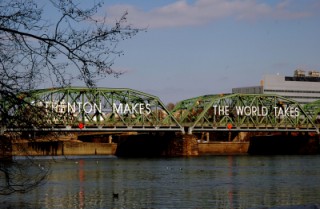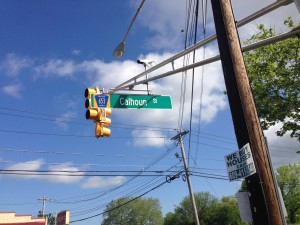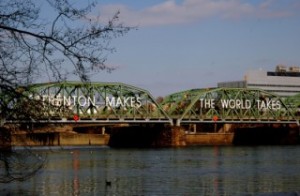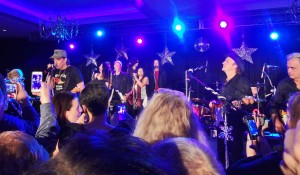Alcohol and the Trenton Music Scene

Will there be alcohol there? Is it BYOB? Can you see them play from the bar? My experiences as a bassist in my high school band taught me a lot. I learned to expect these types of questions when inviting my peers to see us play at a local bar. I learned from other bands that shows at the venues labeled “21+” and “will check ID” always proved to be the most successful – shows that we were too young to play. I learned that music isn’t the foundation for the local music scene. The availability of alcohol is what keeps the audience coming back. The idea that the music industry is dependent on alcohol intrigued me. The enormous power given to a drink seemed so silly. It almost seemed wrong.
This was a subtle truth that nobody ever spoke of. Sit at any venue and look around. All of the adults are sitting at the bar socializing with various alcoholic beverages in their hands. Some have strategically picked a seat where they can see the local music act in their peripheral vision (but all of them will exit the bar with ringing ears, regardless). Look again and count how many people have voluntarily captured an ideal seat for enjoying the band. All of the local music veterans are profoundly amazed at the sight of one kid. Accompanied by slurred speech and whiskey-breath, they go on tangents about how different things are now. This cookie-cutter scenario applies to every music venue I’ve attended. After doing some research, I realized that the old musicians were right. The music scene has changed.
City Gardens was a nightclub located on Calhoun Street in Trenton. A wide array of stories describe its presence as instrumental to the music scene in the book No Slam Dancing, No Stage Diving, No Spikes: An Oral History of the Legendary City Gardens by Amy Yates Wuelfing and Steven Dilodovico.
New Jersey’s drinking age was originally 21, however it was lowered to 18 in 1973. From a historical perspective, this was clearly a poor decision. If one looks beyond the obvious objections, there were some positive effects on the music scene during this time. “The thing that helped us was the lower drinking age” says Randy Now, City Gardens DJ and promotor. “In New Jersey, it was 18, but Pennsylvania was 21, and we were a half mile from the border. Times were different then. We could drink a 12-pack of beer and drive, and no one would bother you. Worst case scenario, if you got pulled over, the cop would take the beer away from you and give it to his own kids. Clubs would card people at the door, but if you had any kind of fake ID they would let you in. The laws were so loose then, no one cared if underage people came in and drank” (Wuelfing & Dilodovico, p. 36).
Sneaking underage drinkers into City Gardens was common ground. Back in 1977, a 17 year old could easily pass as 18. Because of the proximity to the Pennsylvania border, people under 21 in Pennsylvania made trips across the river to obtain alcohol legally at a younger age. “The drinking back then made a huge difference” says Greg Frey, a musician who’s played at City Gardens. “It was college-age music, but college kids aren’t 21 until they’re seniors. Back then you marketed to colleges and college radio, got college gigs, and got kids out to the club” (Wuelfing & Dilodovico, p. 37).
Alcohol played a big role in the Trenton music scene. It was important not only for its appeal to teenagers, but as a long-term marketing tool as well. The appeal of alcohol helped capture kids’ attention and make unions of loyal fans at a young age, something that does not happen locally anymore. In an attempt to gain more insight on the topic, I interviewed local musician Charles Laurita. Charles grew up performing in the Trenton area. He currently fronts the band “Charles Laurita and the Mischief”, a project that he classifies as “alternafunk”. Alongside this project, he’s knowledgeable in many genres of music and a well versed in a multitude of instruments. Charles expressed the importance of capturing kids’ attention at a young age. “If I didn’t have my elementary teacher when I was seven getting me so pumped about playing the violin (which is very important) or my guitar teacher at 10 or my relatives condoning to push music, what would I be now? I’d be bored.”
Even so, guitar lessons is one thing. A room full of drunk kids just sounds like a bad idea, right? Larry Kirwan doesn’t seem to think so. “To me, it was better when you had 18-year-olds drinking in that environment. Now they are drinking too much, and it’s outside of that environment. They aren’t around older, experienced adults who are into the same music and can teach them by example how to drink and act in a club” (Wuelfing & Dilodovico, p. 37). Alcohol is what drove fans to the venues even decades ago. Kids seeking booze would unknowingly develop a sense of community in the music venues.
Despite these effects, the drinking age was becoming a disastrous problem in the Trenton area. Drunk driving became the area’s most feared killer. A local newspaper reported that “Between 1975 and 1981, 257 people died in fatal car accidents. One hundred and six of those deaths were caused by alcohol-related motor vehicle accidents” (Meyer, A6, 1984). In 1979, the New Jersey drinking age was raised to 19. In 1983, the age was raised to 21. The period saw the formation of many organizations such as the Women’s Christian Temperance Union, Mothers Against Drunk Drivers, and Students Against Drunken Drivers (Benner, 1984). The multitude or organizations attempted to combat the various negatives of alcohol in different ways. By the early 1980s, one common goal between the organizations was targeting the youth in order to cut off underage drinking (Camuto, 1984).
By 1988, the Mercer Council on Alcoholism and Drug Addiction celebrated ten years of success. They established the first student assistance program, the first employee assistance program, and the first education/counseling group sessions for drunk drivers (Viksjo, 1988). Over the next two decades, new tactics were created for this time of change such as new scientific information regarding birth defects, updated school programs, and technological advances such as the breathalyzer.
Due to an increased liquor tax, a weakened economy, and hatred resulting from the various anti-alcohol tactics, many businesses chose to let their liquor licenses fall inactive. In Mercer County, the number of inactive liquor licenses rose from 680 in 1989 to 911 in 1990 (Sterling, 1991). Even bars that actively monitored their distribution were targeted by the public. Policies were made to prevent how close in proximity certain liquor venues could be. Needless to say, all of these changes were important for the safety of the people of New Jersey. Victims of drunk driving accidents are no good. These changes took a huge effect on the Trenton music scene.
Today the drinking age is still 21. There’s even controversy that this age is still not high enough. While problems such as underage drinking and drunk driving do still exist, they don’t at nearly as high of a rate as the late 1970s. The difference between then and now is that now kids don’t have their interest grabbed at a young age. People of legal drinking age aren’t attracted by the music but instead by the alcohol. Bands are used as marketing tools for the alcohol, and musical acts are not given the attention they used to have because the increased drinking age cut off a demographic of people.
Throughout my talk with Charles Laurita, he agreed in the prominent role that alcohol plays in the local music scene. “[The higher drinking age] was a huge thing because now it’s a whole group of people that you’re kind of casting out. They changed it back because kids were getting in accidents so obviously that’s better. But that has a huge part; we talk about that all the time. We were looking for venues and new shows and we always pick liquor venues over dry venues just because, it’s a shame to say, you’re not going to get the people. Which it’s a shame that that’s such a huge part of it because I just want to see music. I want to go see people playing instruments – I don’t care what they are. I’m like a soda and a tea guy.” The amount of people that share these opinions are few and far between. Charles consistently cited a scenario of having to cram his 6 piece band into the corner of a venue and quietly play to a captive audience at the bar.
However, not all hope is lost. Charles passionately shared his plans to spruce up one of his favorite venues, Cedar Gardens (now called the Princeton Manor). Charles said that he’s picking up the plans from the former owner, Ted, who was a passionate supporter of the local music scene. “[Ted] was huge in this area because he was really getting a nice venue where it was….What Ted always talked about was “let’s do music in the banquet halls”. We have these halls. We have stages. No one’s using them. Let’s make it a music venue again. And he passed away, so the fact that he wanted to do that was coming full circle. [At Cedar Gardens,] the music was the focus… It was a tiny place but we felt the most at home there and I really liked that kind of closeness in a venue. We wished that he had a bigger place and we were always talking about trying to put a bigger place together and everyone could join forces to make a nice venue in this area.”
“I was contacted a few months ago by cedar gardens because they wanted to start doing music again and they didn’t know how. So they contacted our band…. I tried to make a whole formula on how to make it run smoothly and we did an opening night there and you know we got about 145 people. And that was awesome. And the other thing was we charged a cover and people didn’t care too. Because a lot of people in the area (since the 90s when they did away with a lot of the cover stuff) were spoiled a little bit. They get to see a lot of great acts for free and the bands don’t get payed very well. Bringing thousands of dollars of equipment and putting in hours of work. I want those guys to get paid. My guys work hard, they deserve to get something. You hire a plumber and an electrician for the same amount of time you hire a band for, you get a huge bill.”
After a certain number of gigs with my band, I picked up on this sad fact. We played our songs to a bar. Our payment was dependent on the number of drinks sold that night, not by a cover fee. Many individuals in our audience were simply there to socialize and became captive to our music. Even if we put on a good show, the payment was never amazing. If there’s any venue that could set a precedent for change, it’s Cedar Gardens. Over the past few years I was occasionally involved with the Ernie White Christmas show that was held in the very same venue. The success, praise, and awesomeness of that event deserves an article of its own, but it was amazing to see how different it is from the usual cookie cutter bar gig. The room is filled with hundreds of people who are all there to sit down and watch the bands play. The best part to me was that I didn’t have to be of drinking age to enjoy my favorite local bands. If this attitude could be brought outside of the holiday season, maybe things would change for the better.
Charles Laurita maintains high hopes on the idea. “So I went and I talked to Cedar Gardens about all these different angles of it and they loved the idea… I told them the first night we start music back here again, see how many musicians in the audience that are excited that “Wow, it’s a music venue!” Not a bar. There’s a stage, there’s a sound system. It’s like the lights and the show. It’s a concert. That’s a big part of it. It’s such a foreign thing because you walk into a bar and the band’s jamming in the corner. And yeah its nice but there’s such an atmosphere change and it’s such a big thing and it gets people to just be immersed in it. Now you have a cover charge to pay but we’re not going into a bar, we’re going into a venue… Believe it or not, people from Philadelphia and New York used to come here to see music because it was just so big. Now it’s just gone and it has so much potential to just rise up. And that would peak interest. That’s something that would need to change to bring it all back. If you build it they will come. It’s one of those classic ploys. Which I love and wish it was initiated.”
The music industry is undeniably an alcohol industry. Bands break their backs to earn money performing for an audience that is really just attracted to the availability of alcohol. While this was not the case in the 1970s, the occurrence of alcohol-related car accidents became the foundation for a necessary change for the sake of New Jersey’s people. Today there is a presence of alienation between the local music scene and the bars they play at, making it harder for bands and other musical acts to be successful. The gradual decline of the music venue concept contributed to this as a result of harsher alcohol laws. Maybe soon we will see a rise in the music venue again as people like Charles Laurita work to bring them back into popularity.
References
Benner, T. (1984, August 12). Temperance Union is still pushing for total abstinence. The Trenton Times.
Camuto, R. V. (1984, May 25). Student boozing seen on rise in Mercer. The Trenton Times, p. A20.
Viksjo, C. (1988, December 3). There’s no denying the success of local alcoholism council. The Trenton Times.
Meyer, J. S. (1984, August 10). Mercer task force has sobering plan. The Trenton Times, pp. A1, A6.
Wuelfing, A.Y., & Dilodovico, S. (2014). No slam dancing, no stage diving, no spikes: An oral history of the legendary City Gardens. Morrisville, PA: DiWulf Publishing
Sterling, G. (1991, October 29). Liquor license renewals show a steady drop. The Star Ledger, pp. 1, 16)
Photos
https://en.wikipedia.org/wiki/Lower_Trenton_Bridge#/media/File:Trenton_Makes.jpg




